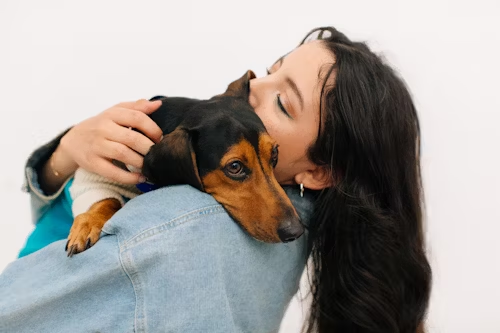Introduction
Just like people, our pets can experience stress and anxiety — often in ways that are easy to miss. Whether it’s fear of thunder, separation from their owners, or a change in routine, anxiety can seriously affect your pet’s wellbeing.
At Blakehurst Vet, we regularly see cats and dogs from Hurstville, Sylvania, and across the St George and Sutherland Shire areas struggling with stress-related issues. The good news? With the right care and understanding, anxiety can be managed effectively, allowing your pet to feel calm, safe, and happy again.
What Is Pet Anxiety?
Pet anxiety is a persistent feeling of fear, nervousness, or unease. It’s more than just a temporary stress response — for many pets, anxiety can become a daily challenge. Left untreated, it may lead to behavioural issues, physical illness, or a reduced quality of life.
Common Signs of Pet Anxiety
Recognising the symptoms early is key to helping your pet. Look out for:
| Behaviour or Sign | What It Might Mean |
| Panting, pacing or trembling | High stress or fear |
| Hiding, avoiding contact | Feeling unsafe or threatened |
| Destructive behaviour | Coping mechanism for distress |
| Excessive barking, whining, or meowing | Seeking reassurance or showing fear |
| Over-grooming or fur loss | Repetitive behaviour due to anxiety |
| Loss of appetite or digestive upset | Physical impact of emotional stress |
| House soiling | Loss of control caused by fear or panic |
Common Causes of Anxiety in Pets
Here in Sydney, the busy environment and unpredictable weather can trigger anxiety in pets. Some of the most common causes include:
- Loud noises — Thunderstorms, fireworks, or construction sounds.
- Separation — Being left alone for long periods, especially after post-lockdown changes.
- Changes in routine — Moving house, new family members, or shifting schedules.
- Visits to unfamiliar places — Boarding, grooming, or vet visits.
- Trauma or past neglect — Especially for rescue animals.
- Ageing — Senior pets can develop anxiety linked to cognitive decline.
How to Help an Anxious Pet at Home
1. Provide a Calm, Safe Space
Create a quiet, secure area in your home where your pet can retreat when they feel overwhelmed. Soft bedding, familiar scents, and reduced noise levels can help them relax.
2. Keep a Consistent Routine
Regular feeding times, walks, and play sessions provide stability and predictability — vital for anxious pets.
3. Encourage Gentle Socialisation
Expose your pet to new experiences gradually. Start with small, positive interactions to build confidence.
4. Use Positive Reinforcement
Reward calm, relaxed behaviour with treats and affection. Avoid punishment, as it can increase fear and anxiety.
5. Consider Calming Aids
Products such as pheromone diffusers, pressure wraps, or calming supplements may help mild cases. Always check with your vet before introducing new products.
When to Visit Blakehurst Vet
Some forms of anxiety require professional support. Book an appointment if your pet:
- Shows ongoing signs of stress that don’t improve
- Becomes aggressive or withdrawn
- Develops digestive issues or stops eating
- Injures themselves by scratching, biting, or over-grooming
- Experiences sudden changes in behaviour
At Blakehurst Vet, we can perform a full assessment, rule out underlying medical conditions, and create a tailored treatment plan. In some cases, medication or behaviour therapy may be recommended.
Supporting Your Pet Long-Term
- Schedule regular vet check-ups to monitor your pet’s health.
- Begin socialisation early — especially for puppies and kittens.
- Keep home environments calm during storms or fireworks.
- Offer plenty of playtime and mental stimulation to prevent boredom.
- Be patient — building confidence and emotional balance takes time.
Conclusion
Anxiety in pets is common but manageable with the right approach. As your local veterinary team in Blakehurst, we’re here to help you recognise the signs early and provide practical, compassionate solutions.
If your pet is showing signs of anxiety or stress, contact Blakehurst Vet Sydney today for expert advice and care.

